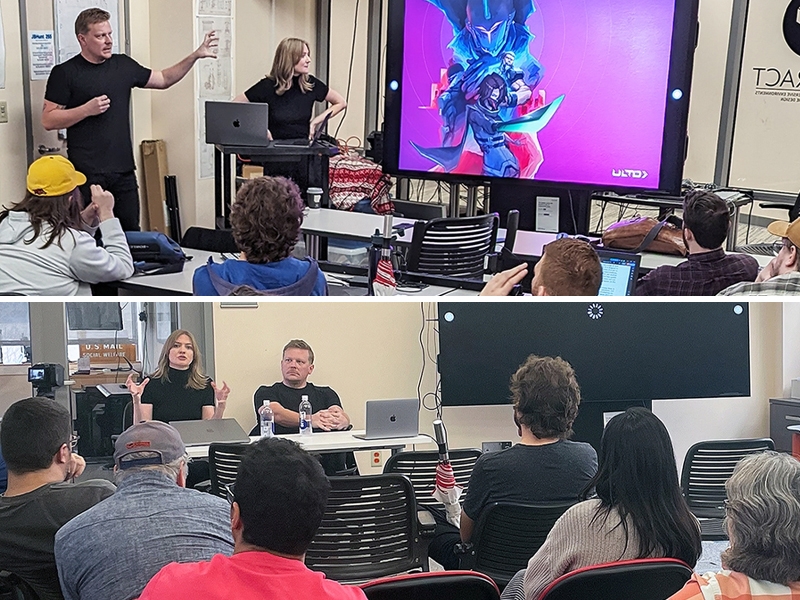
On Thursday, March 14, game designers Joe Payne and Stephanie Essin from ULTD Studio held a live demo of the ULTD Living Story Engine at the World Languages & Digital Humanities Studio in J.B. Hunt Center 207.
Payne and Essin have previously visited the studio to participate in the studio's artificial intelligence series for "AI and Storytelling" as well as guest lecturing in Studio Director Curtis Maughan's DH Special Topics Course: "Humanities in the Metaverse."
The Living Story Engine, created by Payne & Essin, utilizes generative artificial intelligence to assist with brainstorming and storyboarding for narrative game design. Payne and Essin began the demo by discussing their views on AI and how AI can be used ethically and effectively to assist with ideation for world building and background creation of game characters — a process that once took several days reduced to a few minutes.
The live demo also featured a discussion about how the Living Story Engine — and all generative AI — can be used positively in the classroom. This semester, Payne and Essin have collaborated with Maughan and professor David Fredrick on building learning units that feature the Living Story Engine. In Fredrick's Game Design II course, students are using an early beta version of Living Story Engine as an ideation tool to construct massive storyworlds informed by world mythologies, forming the basis for environments, storylines and mechanics constructed in the Unity game engine. In Maughan's DH Special Topics course Videogames and Human Agency, Essin and Payne visited to discuss how AI is impacting the growing sector of indie game development, contributing to diversity and inclusion in the game industry.
Reflecting on the collaboration of WLLC's game design and digital humanities programs with ULTD Studio, Maughan had the following to say: "We are incredibly lucky here at the U of A to have the opportunity to work with a local design studio that is innovating at the cutting edge of narrative design and AI. I can't wait to see all the exciting ways to integrate the Living Story Engine into U of A classes, including my colleague Dave Fredrick's courses on immersive illuminated manuscripts in fall 2024 and MetaRomans in spring 2025. There is great interdisciplinary potential here, and the combination of game design skills with a digital humanities perspective and positive, responsible use of AI is critical for student success in tech and creative industries. We hope to expand these efforts to any and all departments interested in AI and digital storytelling!" To join this collaborative effort, please email Maughan directly at cmaughan@uark.edu.
The next event at the WLDH Studio will be the DH Meet-Up on Thursday, March 28. Led by Daniela D'Eugenio (professor of Italian) and Alena Shestopolova (foreign language teaching assistant), they will demonstrate how to incorporate "izi.travel" in the classroom.
Topics
Contacts
Cheyenne Roy, assistant director
World Languages and Digital Humanities Studio
479-575-4159, ceroy@uark.edu